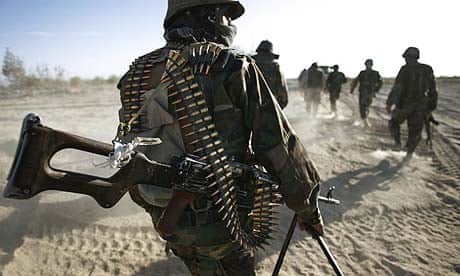Hamid Karzai, Afghanistan's president, escalated tensions with neighbouring Pakistan yesterday by threatening to send troops across the border to hunt down the Taliban's leadership.
Karzai said his country had the right to defend itself against insurgents crossing from bases inside Pakistan's tribal belt.
"When they cross the territory from Pakistan to come and kill Afghans and kill coalition troops, it exactly gives us the right to go back and do the same," he told journalists in Kabul.
"Baitullah Mehsud should know that we will go after him now and hit him in his house," he said, referring to the militant leader accused of orchestrating the assassination of Benazir Bhutto.
"And the other fellow, Mullah Omar of Pakistan, should know the same," he added, referring to the Taliban's leader.
Karzai's language and message was aggressive, even by the testy standards of Afghan-Pakistani relations.
Yousaf Raza Gilani, Pakistan's prime minister, responded firmly, saying he would "[not] allow anyone to interfere in our national limits and our affairs", and insisting that a stable Afghanistan was in Pakistan's interests.
Karzai's outburst followed Friday night's jailbreak by the Taliban in Kandahar, when dozens of militants staged a multi-pronged assault on the city jail that freed 890 prisoners, including 390 Taliban fighters.
The US military said yesterday it killed 15 suspected insurgents during a firefight at a farmhouse outside Kandahar, as troops combed the area for the fugitives. A statement said that fighters opened fire on coalition troops as they approached the building, prompting an American airstrike. That version of events could not be independently confirmed.
In Kandahar city, authorities urged citizens to remain indoors to help the manhunt. But a senior foreign official working there, speaking on condition of anonymity by phone, said traffic was flowing and people were venturing into the streets. "I don't see anything abnormal," he said.
The jailbreak was another setback for Karzai, who survived an assassination attempt six weeks ago. Addressing journalists in Kabul's presidential palace yesterday, he said it demonstrated the need to strengthen security and "to be a lot more alert and steadfast in our resolve in confronting terrorism".
He reserved his harshest words for Pakistan. In the past, Karzai called for Pakistani soldiers to flush the Taliban out of their tribal hideouts, but never threatened to do the job himself.
Afghans would no longer flinch from going on, what he termed, a "two-way road journey". He said: "We will complete the journey and we will get them and we will defeat them. We will avenge all that they have done to Afghanistan for the past so many years."
The beleaguered president had just returned from a donors' conference in Paris where allies pledged $20bn (£10.2bn) to rebuild Afghanistan over the next five years - $30bn less than the amount sought by the Afghan government.
Realistically Karzai cannot despatch Afghan soldiers into Pakistan without consent from the US military and Nato, which together have 62,000 troops in Afghanistan. But here, too, tensions are rising.
Last week Pakistan protested furiously after US warplanes apparently bombed a Pakistani border post, killing 11 soldiers, as they pursued suspected insurgents fleeing across the border. Both sides have agreed to a joint investigation.
In May, American and allied deaths in Afghanistan passed the monthly toll in Iraq for the first time - a grim gauge of two conflicts going in opposite directions. Five British soldiers have been killed in the past week. A senior officer, Lieutenant Colonel David Richmond, commanding officer of the Argyll and Sutherland Highlanders, was shot in the leg during a fight near Musa Qala, in Helmand province on Thursday.
American officials warn that unless Pakistan shuts down the Taliban sanctuary in tribal hotbeds such as Waziristan, the Afghan insurgency could drag on for many years. Pakistan hopes to curb the problem through peace talks with militants such as Mehsud. Based in the mountains of south Waziristan, Mehsud heads Tehrik-i-Taliban Pakistan, the largest militant group. Negotiations are proceeding slowly. Meanwhile, gunmen continue to torch girls' schools and execute suspected informants, such as a woman found beheaded near the Afghan border last week.
Backstory
The war of words between Pakistan and Afghanistan is as old as the Taliban. Having nurse-fed them in the 1990s, Pakistan was forced to cut ties in 2001. Doubts persisted whether the break was complete. A swelling chorus of Afghan and western officials accuse Pakistan of playing a double game - publicly shunning the Taliban but privately turning a blind eye, or even providing active help. As the insurgency has grown, so has the sniping between the countries. At one point recently President Pervez Musharraf accused Karzai of behaving "like exactly an ostrich".
